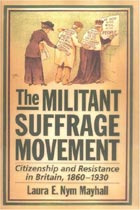Author's response
| Book: | The Militant Suffrage Movement. Citizenship and Resistance in Britain 1860-1930Laura E. Nym MayhallOxford: Oxford University Press, 2003 ISBN 0-19-515-993-4; pp. xiii + 218 |
| Reviewer: | June HannamUniversity of the West of England |
I begin by thanking Dr Hannam for her thoughtful engagement with my book. I appreciate especially her care in representing my arguments and wish to respond to the very important questions she raises.
As Dr Hannam notes, it is difficult to make an original contribution to the literature on women’s suffrage in the British context as a good deal of very high quality research has been produced in the last twenty years. Much of that work has been done by social historians, who have understandably been concerned with locating suffragists at the centre of their accounts. My contribution has been to reorient the debate, in order to contextualize the women’s suffrage movement within late-Victorian and Edwardian political culture. I have redrawn the distinction between militants and non-militants on the basis of the attitudes each took toward the state, thereby blurring the constitutional/militant dichotomy, but from a direction not traditionally taken. All suffragists were constitutionalists in that they believed that the British constitution and political tradition included women. They differed on how to obtain political satisfaction. Members of the National Union of Women’s Suffrage Societies demanded political rights, but members of the militant organisations refused to cooperate with the government so long as women went unenfranchised. The distinction is critical because it speaks to an engagement with the state drawing from the liberal and radical traditions, respectively. In this sense, my argument widens and deepens analysis of the relationship between women’s suffrage and radicalism as it locates militancy as a political strategy with roots in radical, rather than strictly labor, traditions.
My emphasis on radical, rather than labour, traditions means that my focus is less on socialism and Labour Party activism than it is on the relationship between liberalism and radicalism in late nineteenth- and early twentieth-century British politics. In this respect, my work seeks to break free from paradigms which locate women’s suffrage within the framework of social history, emphasising the recovery of women’s agency by demonstrating the existence of a separate women’s culture among suffragists. The Militant Suffrage Movement attempts to resituate one specific struggle for women’s political rights (the militant strand within the British movement) within the broader framework of the development of democracy. In that telling, the struggle for the vote is less a triumphal progress towards full equality than it is a skirmish in the development of liberal democracy, wherein the enfranchisement of women masks the troubling reduction of a process (citizenship) to a status by its redefinition as the mere act of voting. Consequently, individual and group engagement with the state is the subject of scrutiny, rather than the political loyalties and identifications of women.
November 2004

